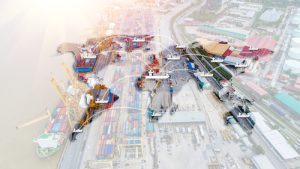
5 Key Impacts of Industry 4.0 On Logistics 4.0
Customer demand and technological innovations have been the key to the emergence of new challenges, which is leading to industry changes. This transformation will dramatically influence how organisations will be managed according to the new environmental and contextual configuration.
Logistics 4.0 and Supply Chain Management 4.0 concern the various aspects of end-to-end logistics in the context of Industry 4.0, the Internet of Things, emerging technologies as well as advanced data enabled by AI. Everyone must follow these technological evolvements because this change is being done very quickly, allowing us to refer to the new Industrial revolution, commonly known as the fourth industrial revolution (Industry 4.0).

Industry 4.0 in the supply chain management
Industry 4.0 in supply chain management encompasses the development and integration of innovative information and communication technologies into the industry. The main goal is to foster the intelligent networking of products and processes along the value chain.
With rapid advancements in analytics and machine learning (ML), companies can now proactively examine transactional data in near real-time and use the insights derived to plug the gaps and revenue losses—the impact can be as high as 10% in some industries. From driverless transportation to intelligent containers, smart warehousing and smart ports, all these things can be incorporated from the fourth industrial revolution.

IMPACT ON LOGISTICS 4.0
The demand for high-customised products and services is continuously increasing. Thus, inbound and outbound logistics must adapt to this changing environment. Due to its increasing complexity, it cannot be handled with ordinary planning and controlled practices:
Industry 4.0 is the sum of all disruptive innovations derived and implemented in a value chain to address the trends of digitalization, autonomation, transparency, modularization, transportation and distribution. The following five processes with the impact of industry 4.0 are discussed below-
- Digitalization- The company’s internal processes, product components, communication channels and all other key aspects of the supply chain are undergoing an accelerated digitalization process. The digitalization process itself is the most important characteristic feature and enables all other categorizing features that may include a rise in the 4PL providers. Disruption must be expected as the shift in technology enables new players to enter the 4PL market.
- Transparency– While global supply chains are characterized by highly complex structures, the available “Industry 4.0” technologies are increasing the transparency of the whole value creation process. Through this increase in transparency, decision-making in the company will be more collaborative and efficient. Not only the supply chain processes but also the behavior of corporate partners and customers will be more transparent to the company.
- Autonomation- Industry 4.0 technologies and concepts are enabling machines and algorithms of future companies to make decisions and perform learning-activities autonomously. This autonomous decision-making and learning is based on man-made algorithms and enables whole factories and manufacturing facilities to work with minimum human-machine interaction.
- Modularization– Industry 4.0 technologies are enabling the modularization of products and the whole value creation process, e.g. manufacturing facilities. Modular production facilities can be adjusted in their quantity autonomously, which is increasing the flexibility of the production processes.
- Transportation and Distribution- The distribution activities will be re-thought and new technologies will be implemented as well since with transporting systems performing autonomous decisions based on pre-implemented algorithms, the logistics processes are already within the autonomation process. Algorithms may also enable products to make autonomous decisions during outbound-logistics activities in the digitalized supply chain of the future.
The biggest impact of the “Industry 4.0” technologies and concepts is to be expected from a technological view especially for the procurement, production and distribution activities in the supply chain. The organisation of logistics from a technological view will mainly change due to the implementation of BI-technologies, Smartphone Apps, AIDC- and RFID-technologies and the miniaturisation of electronics. However, structural changes to the organisation are to be expected mainly in manufacturing processes.
Its all about the way logistics and supply chain management meet the needs of the stakeholders, keeping in mind the smart supply chain decision. All these decisions are enabled by human and technological components of industry 4.0 and logistics 4.0. Only a well-defined path can enable the performance and speed keeping the quality intact.
Author Bio– Jyoti Sharma, Consultant / Writer
I am a budding and aspiring blogger and my area of interests are Supply Chain, Logistics, Retail Logistics, International Freight etc. Being a writer by profession and by choice I like to contribute to various quality websites especially those who talk about my area of interests.
We grow by making people happy and successful.
If you have an article or opinion you would like to share with IoSCM readers and members please email us – kimberley.jayne@ioscm.com or info@ioscm.com

